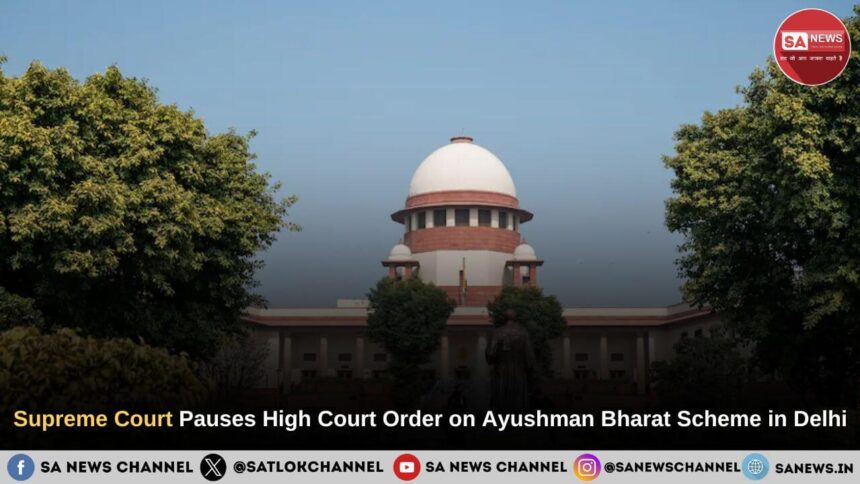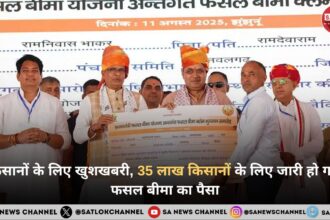Ayushman Bharat Scheme in Delhi: In a significant legal development, the Supreme Court has paused a Delhi High Court order that mandated the Delhi government to sign a Memorandum of Understanding (MoU) to implement the Ayushman Bharat Health Infrastructure Mission (PM-ABHIM) scheme. This decision came after the Delhi government challenged the High Court’s directive, arguing that it would impose financial burdens on the state without adequate support from the Centre.
Background of the Ayushman Bharat Scheme
The Ayushman Bharat Health Infrastructure Mission (PM-ABHIM) is a central government initiative launched in 2020 with the aim of improving health infrastructure across India. The scheme is part of the broader Ayushman Bharat program, which seeks to provide comprehensive health coverage to the Indian population, particularly the economically vulnerable sections.
Ayushman Bharat Scheme in Delhi: PM-ABHIM focuses on filling gaps in health infrastructure, including the establishment of new health and wellness centers, upgrading existing facilities, and enhancing diagnostic and treatment capabilities. The scheme also aims to strengthen public health institutions and create a robust health surveillance system.
Also Read: Justice with Eyes Open: Supreme Court’s New Lady Justice Now Holds Constitution Instead of Sword
Ayushman Bharat Scheme in Delhi: Under PM-ABHIM, the central government provides financial assistance to states and union territories to develop their health infrastructure. The funding is typically shared between the Centre and the states, with the Centre bearing a significant portion of the capital expenditure. However, the states are responsible for the running costs and maintenance of the facilities.
The scheme is designed to ensure that all citizens have access to quality healthcare services, regardless of their socio-economic status. It aims to reduce the burden on tertiary care hospitals by strengthening primary and secondary healthcare facilities. By doing so, PM-ABHIM seeks to create a more equitable and efficient healthcare system in India.
Delhi Government’s Opposition
The Delhi government, led by the Aam Aadmi Party (AAP), has been vocal in its opposition to the implementation of the Ayushman Bharat Health Infrastructure Mission (PM-ABHIM) in the national capital. The AAP government argues that the scheme is not suitable for Delhi’s unique healthcare needs and would impose an undue financial burden on the state.
Ayushman Bharat Scheme in Delhi: One of the primary concerns raised by the Delhi government is the financial arrangement under PM-ABHIM. According to the scheme, the Centre would bear 60% of the capital expenditure, while the state would be responsible for the remaining 40%. However, the Centre would not cover any of the running costs, leaving the state to manage the ongoing expenses. The Delhi government contends that this arrangement is not feasible given the city’s existing financial commitments and health infrastructure.
The AAP government also argues that Delhi already has its own robust health schemes, such as the Delhi Arogya Kosh (DAK), which provide comprehensive health coverage to a larger portion of the population compared to PM-ABHIM. The DAK scheme, according to the Delhi government, is better suited to the city’s needs and offers more extensive benefits than the central scheme.
In addition to financial concerns, the Delhi government has raised issues related to the autonomy and powers of the state. Senior advocate AM Singhvi, representing the Delhi government, argued in the Supreme Court that the High Court’s order effectively redefined the powers of the central government regarding health. He emphasized that forcing the state to sign the MoU would undermine the state’s authority and autonomy in managing its health affairs.
Political Implications and Reactions
The legal battle over the implementation of the Ayushman Bharat Health Infrastructure Mission (PM-ABHIM) in Delhi has significant political implications, particularly with the upcoming elections in the national capital. The issue has become a flashpoint in the ongoing political conflict between the Bharatiya Janata Party (BJP) and the Aam Aadmi Party (AAP).
Ayushman Bharat Scheme in Delhi: The BJP has accused the AAP government of blocking the central scheme for political reasons, arguing that the AAP is more focused on opposing the Centre than on public welfare. The party’s Delhi unit chief has claimed that the AAP’s opposition to PM-ABHIM is driven by “dirty politics” and that the party does not want the people of Delhi to benefit from the scheme.
On the other hand, the AAP has argued that the BJP’s push for the implementation of PM-ABHIM in Delhi is politically motivated. The Delhi government contends that the scheme is not suitable for the city’s unique healthcare needs and that the BJP is using the issue to gain political mileage ahead of the elections. The AAP has also pointed out that the petitioners who brought the case to the High Court are BJP MPs, further highlighting the political nature of the dispute.
The Supreme Court’s decision to pause the High Court order has added another layer of complexity to the political landscape in Delhi. The AAP government sees the decision as a validation of its stance against the central scheme, while the BJP views it as a temporary setback in its efforts to implement PM-ABHIM in the city.
Ayushman Bharat Scheme in Delhi: As the legal proceedings continue, the political rhetoric is expected to intensify, with both parties using the issue to rally their supporters and criticize their opponents. The outcome of this legal battle will likely have a significant impact on the political dynamics in Delhi, particularly in the context of the upcoming elections. The resolution of this issue will be closely watched by political analysts and the public alike, as it could influence voter sentiment and the overall electoral outcome.









